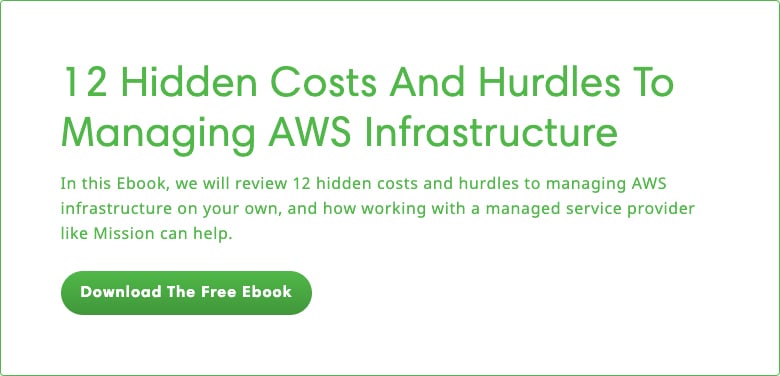Blog
The Problem of Undifferentiated Heavy Lifting
Undertaking a complex endeavor, from opening a store to building a house, brings with it a long list of required work that isn’t necessarily visible in the final product. A store has to deal with the logistics of shipping and, if it’s a brick-and-mortar operation, acquiring a lease, and none of that effort is visible on the shelves. A contractor has to manage carpenters, plumbers, and electricians, and the eventual homeowner hopefully won’t know anything about all that—they’ll just reap the benefits. Required efforts like these are sometimes called “the cost of doing business” or “the price of admission.”
So it is in the IT world, where running a data center involves server hosting, negotiating software contracts, managing bandwidth, and coordinating the people that take care of those. When it comes to developing apps or Web services, the list might also include tracking and analytics, ensuring compliance, authenticating customers, and maintaining security.

These (and more) make up the “undifferentiated heavy lifting” faced by Web entrepreneurs. The term originated with a keynote Jeff Bezos gave in 2006 and describes all of the hard IT work that companies do that doesn’t add value to the mission of the company. At the time, Bezos estimated that developers spent 70% of their time on such backend work. Twelve years later, IDC estimated the figures had grown to 80%.
The cloud is complex
Those numbers aren’t surprising given the sheer complexity of managing the cloud. A majority of respondents in this survey said they were using more than six tools and services, with over 20 percent using more than ten. And more than four out of five said that trying to create their own solutions in-house just made more problems.
The problem for businesses with operations in the cloud is that such undifferentiated heavy lifting is no more visible to their customers, and does no more to distinguish the company’s offerings, than the details of a store’s lease matters to shoppers. Ultimately, it makes sense to devote as much of your effort as possible to the parts of your business that customers value you for, and to leave the undifferentiated heavy lifting to an outside expert.
Let someone else do the lifting
Platforms like AWS can relieve you of much of the infrastructure management that would otherwise burden your business. But to really take advantage of the relief AWS can offer, consider handing off the other aspects of undifferentiated heavy lifting to a managed service provider—a partner that will make sure your company or your application has the food and water it needs while you focus on your unique business problems.
When it comes to AWS, Mission, an AWS Premier Consulting Partner, provides managed services on several fronts. If you’re still managing your own data center or using a cloud service with limited options, we can help you migrate your current operations to AWS, We hold the AWS Migrations Competency and can help you understand your licensing needs and forecast and optimize your cost.
Our Managed Detection and Response service is a comprehensive security solution that ensures your AWS environment meets rigorous security and compliance standards. Our Managed DevOps service can help you iterate more quickly to speed up delivery of new products. Additionally can help you take advantage of emerging technologies when they’re appropriate for your needs, such as employing containers and microservices, or leveraging automation to optimize efficiency and realize the benefits of serverless architectures.
Bottom line? Stop worrying about doing all that undifferentiated heavy lifting yourself, and find a leverage a managed service provider service provider can do for you.
FAQ
What are some specific examples of undifferentiated heavy lifting tasks in IT that companies often find themselves unnecessarily spending time on?
Undifferentiated heavy lifting in IT encompasses tasks essential for maintaining infrastructure, like server upkeep, software patching, and data storage management. These are vital yet do not contribute to competitive advantages, diverting focus and resources from strategic initiatives that could drive growth and innovation.
What are the initial steps a company should take when moving away from undifferentiated heavy lifting to using managed services or cloud solutions?
For companies considering a shift from undifferentiated heavy lifting to managed services or cloud solutions, the initial steps should include assessing current IT tasks to identify which are non-core, researching potential managed service providers, and evaluating the cost-effectiveness and scalability of outsourcing these tasks to focus more on strategic, value-adding activities.
How does focusing on undifferentiated heavy lifting affect a company's ability to innovate and stay competitive in their industry?
Focusing on undifferentiated heavy lifting can significantly hinder a company's ability to innovate and remain competitive. Resources spent on routine maintenance could be redirected towards research and development, creating new products or services that distinguish the company in its industry.
Author Spotlight:
Jackie Berkman
Keep Up To Date With AWS News
Stay up to date with the latest AWS services, latest architecture, cloud-native solutions and more.

